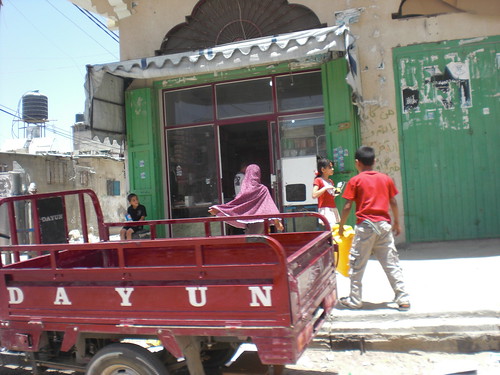‘We escaped from danger into death’: desperation inside Gaza’s hospitals as casualties mount
Gaza #Gaza

In previous encounters, says Nebal Farsakh, there would always be some time without airstrikes.
“But now, there is not a single minute. That’s why the casualties keep going up and up,” says Farsakh, spokesperson for the Palestinian Red Crescent.
At Shifa hospital in Gaza city, reporters from the Associated Press witnessed wounded people streaming through the doors as lifeless bodies arrived under bedsheets. As workers mopped up blood, and relatives rushed children with shrapnel wounds into surgery, explosions continued to thunder around the hospital.
Over five days, Israeli warplanes have pummelled Gaza with an intensity that its war-weary residents had never experienced. The airstrikes have killed more than 1,100 people, according to the Gaza Health Ministry. Officials have not said how many civilians are among the dead, but aid workers warn that Israel’s decision to impose a “complete siege” on the crowded enclave of 2.3 million people is spawning a humanitarian catastrophe that touches nearly every one of them.
There is no clean water, and after the territory’s only power plant ran out of fuel on Wednesday, electricity has become a precious commodity, while the enclave sits in near-total darkness during the night.
“This is an unprecedented scope of destruction,” says Miriam Marmur, a spokesperson for Gisha, an Israeli human rights group. “Israeli decisions to cut electricity, fuel, food and medicine supplies severely compound the risks to Palestinians and threaten to greatly increase the toll in human life.”
The Israeli bombardment has escalated in retaliation for Hamas militants’ unprecedented attack in which the military says more than 1,200 Israelis were killed and dozens more abducted.
locator map
Even in ordinary times, Gaza hospitals are poorly supplied, says Richard Brennan, regional emergency director of the World Health Organization. Now, there’s a shortage of everything from bandages to intravenous fluids, beds to essential drugs.
“It’s almost as bad as it gets,” says Brennan. “It’s not just the damage, the destruction. It’s that psychological pressure. The constant shelling … the loss of one’s colleagues.”
In Shifa hospital, Muhammad al-Gharabli told AP how he had witnessed missiles crashing into a mosque in the seaside Shati refugee camp on Monday, decapitating his two-year-old son, Mohammed, and sending shrapnel into the leg of his five-year-old son, Lotfi.
Patients are treated at al-Shifa hospital in Gaza in the wake of airstrikes by Israeli forces in response to Hamas’ attacks on the weekend. Photograph: Ajjour Mahmoud/SIPA/Shutterstock
Al-Gharabli says that when he regained consciousness, he saw the bodies of dozens of neighbours strewn over the ruins of their homes.
Israel says it is going after only militant targets and does its utmost to avoid civilian casualties – a claim many Palestinians in Gaza reject.
Eight journalists have been killed, local media organisations said, and six medics, according to the Palestinian Red Crescent. The UN agency for Palestinian refugees reported 11 of its staffers among the dead.
“I lived through all the wars and incursions in the past, but I have never witnessed anything worse than this war,” Yamen Hamad, 35, a father of four, told Reuters after his home in the northern town of Beit Hanoun was destroyed by Israeli strikes.
The settlement, near the frontier with Israel, was among the first places hit hard by retaliatory strikes, with many roads and buildings destroyed and thousands of displaced, according to Hamas and local residents.
Ala al-Kafarneh told Reuters that he fled the town on Saturday with his pregnant wife, his father, brothers, cousins and in-laws. They drove to a refugee camp on the coast, where they hoped they would be safer, but air attacks began targeting that area, too, so they headed to Sheikh Radwan, another district farther east.
Satellite view of the aftermath of Israeli strikes on Gaza city. Photograph: Maxar Technologies/Reuters
On Tuesday night, an airstrike hit the building where he and his family were sheltering, killing all of them except him. “We escaped from danger into death,” Kafarneh said outside Shifa hospital.
Kafarneh spoke on the pavement outside the hospital where hundreds had gathered, some saying they hoped that their proximity to the facility might spare them from the bombardment.
Some had brought blankets or strips of cardboard to sleep on, others had flung themselves straight down on to the bare ground. There were long queues for people to use the few toilets inside the hospital.
Among them was Youssef Dayer, who told Reuters that he was homeless now. “Maybe it’s safe,” he says hopefully. “Maybe. It’s a peaceful civilian place, right? Maybe not. Nowhere seems safe.”
Reuters and Associated Press contributed to this report